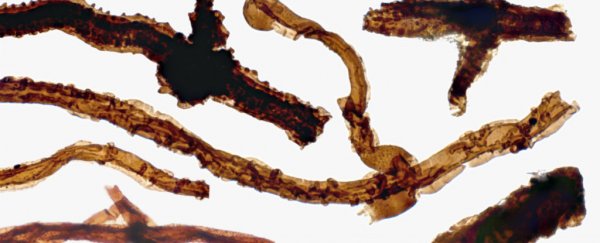Researchers in the UK have announced the discovery of a 440-million-year-old fungus fossil that was likely one of the first organisms to ever dwell on land, and might have kick-started the process of rot, which transformed the landscape to support more complex life.
Though you have probably never sat down and thought about rot because, well, gross, it's a vitally important process for life on our planet. We owe our ability to live to this process. Now, a team from the University of Cambridge believes they've found one of the first organisms responsible for it.
According to the team, nearly half a billion years ago, Tortotubus, an organism that resembles modern fungi, made its way to land and started decomposing materials that transformed Earth's soil, which set the groundwork for more complex life such as plants and animals.
Though it's hard for them to say that Tortotubus was, in fact, the very first land organism, the newly found fossil is the oldest ever found.
"During the period when this organism existed, life was almost entirely restricted to the oceans: nothing more complex than simple mossy and lichen-like plants had yet evolved on the land," said one of the team, Martin Smith. "But before there could be flowering plants or trees, or the animals that depend on them, the processes of rot and soil formation needed to be established."
The discovery was made when Smith was studying a bunch of different microfossils from Sweden and Scotland. These tiny fossils, which are smaller than a human hair, were originally identified in the 1980s, but researchers previously thought they were pieces of different organisms.
After analysing them thoroughly, Smith discovered that they were actually from one single organism. Specifically, that they were of mycelium, the tiny parts of fungi that can scrub nutrients from soil. From there, he was able to examine the fungi's structure further and conclude that it likely lived on land.
Basically, Smith put together an ultra-small biological puzzle that, when completed, revealed an organism that literally changed the world.
Researchers believe that fungi like Tortotubus emerged from the world's oceans in the early Palaeozoic era some 500 million years ago. Once on land, these tiny organisms most likely feasted on algae or bacteria, though this point is still debated rather heavily.
By doing so, the fungi added nitrates to the soil and built up a base for root-based plants to grow. These plants then made life possible for other creatures, eventually leading to complex animals and even us. Life, like Rome, wasn't built in a day – it took a long time and had many steps along the way. This discovery may show us one of the very first pieces.
The new find will undoubtedly help us better understand how life formed early in the Palaeozoic era, and it'll be interesting to see where the research goes next.
You can read the full study in the Botanical Journal of the Linnean Society.
